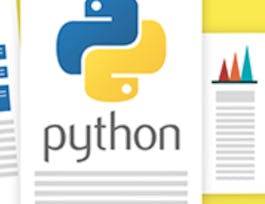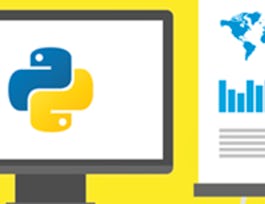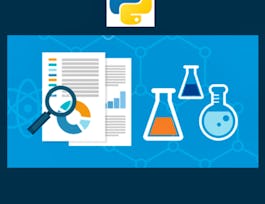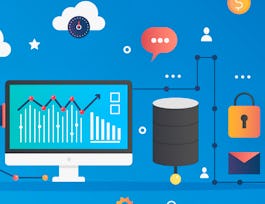Working knowledge of SQL (or Structured Query Language) is a must for data professionals like Data Scientists, Data Analysts and Data Engineers. Much of the world's data resides in databases. SQL is a powerful language used for communicating with and extracting data from databases.


Databases and SQL for Data Science with Python
This course is part of multiple programs.
Taught in English
Some content may not be translated


Instructors: Rav Ahuja
435,886 already enrolled
Included with 
Course
(19,370 reviews)
94%
Recommended experience
What you'll learn
Analyze data within a database using SQL and Python.
Create a relational database and work with multiple tables using DDL commands.
Construct basic to intermediate level SQL queries using DML commands.
Compose more powerful queries with advanced SQL techniques like views, transactions, stored procedures, and joins.
Skills you'll gain
Details to know

Add to your LinkedIn profile
17 assignments
Course
(19,370 reviews)
94%
Recommended experience
See how employees at top companies are mastering in-demand skills

Build your subject-matter expertise
- Learn new concepts from industry experts
- Gain a foundational understanding of a subject or tool
- Develop job-relevant skills with hands-on projects
- Earn a shareable career certificate


Earn a career certificate
Add this credential to your LinkedIn profile, resume, or CV
Share it on social media and in your performance review

There are 6 modules in this course
In this module, you will be introduced to databases. You will learn how to use basic SQL statements like SELECT, INSERT, UPDATE and DELETE. You will also get an understanding of how to refine your query results with the WHERE clause as well as using COUNT, LIMIT and DISTINCT.
What's included
6 videos2 readings2 assignments3 app items3 plugins
In this module, you’ll learn more about relational database concepts and their importance. This module helps you to understand the process of creating a table in your database on MySQL using the graphical interface and SQL scripts. Further, you will also learn how to alter the entries or delete the entries for any table in the database, or even delete the table itself.
What's included
5 videos2 readings2 assignments3 app items4 plugins
This module helps you learn how to use string patterns and ranges to search data and how to sort and group data in result sets. You will also practice composing nested queries and execute select statements to access data from multiple tables.
What's included
7 videos4 readings4 assignments4 app items2 plugins
In this module you will learn the basic concepts of using Python to connect to databases. In a Jupyter Notebook, you will create tables, load data, query data using SQL magic and SQLite python library. You will also learn how to analyze data using Python.
What's included
6 videos2 readings2 assignments7 app items1 plugin
In this module, you will be working with multiple real-world datasets for the city of Chicago. You will be asked questions that will help you understand the data just as you would in the real world. You will be assessed on the correctness of your SQL queries and results.
What's included
2 videos3 readings2 assignments3 app items
This module covers some advanced SQL techniques that will be useful for Data Engineers. In this module, you will learn how to build more powerful queries with advanced SQL techniques like views, transactions, stored procedures, and joins. If you are following the Data Engineering track, you must complete this module. Completion of this module is not required for those completing the Data Science or Data Analyst tracks.
What's included
6 videos4 readings5 assignments5 app items2 plugins
Instructors


Offered by
Recommended if you're interested in Data Analysis
Why people choose Coursera for their career




Learner reviews
Showing 3 of 19370
19,370 reviews
- 5 stars
75.19%
- 4 stars
18.30%
- 3 stars
3.90%
- 2 stars
1.16%
- 1 star
1.42%
New to Data Analysis? Start here.

Open new doors with Coursera Plus
Unlimited access to 7,000+ world-class courses, hands-on projects, and job-ready certificate programs - all included in your subscription
Advance your career with an online degree
Earn a degree from world-class universities - 100% online
Join over 3,400 global companies that choose Coursera for Business
Upskill your employees to excel in the digital economy
Frequently asked questions
Access to lectures and assignments depends on your type of enrollment. If you take a course in audit mode, you will be able to see most course materials for free. To access graded assignments and to earn a Certificate, you will need to purchase the Certificate experience, during or after your audit. If you don't see the audit option:
The course may not offer an audit option. You can try a Free Trial instead, or apply for Financial Aid.
The course may offer 'Full Course, No Certificate' instead. This option lets you see all course materials, submit required assessments, and get a final grade. This also means that you will not be able to purchase a Certificate experience.
When you enroll in the course, you get access to all of the courses in the Certificate, and you earn a certificate when you complete the work. Your electronic Certificate will be added to your Accomplishments page - from there, you can print your Certificate or add it to your LinkedIn profile. If you only want to read and view the course content, you can audit the course for free.
If you subscribed, you get a 7-day free trial during which you can cancel at no penalty. After that, we don’t give refunds, but you can cancel your subscription at any time. See our full refund policy.





